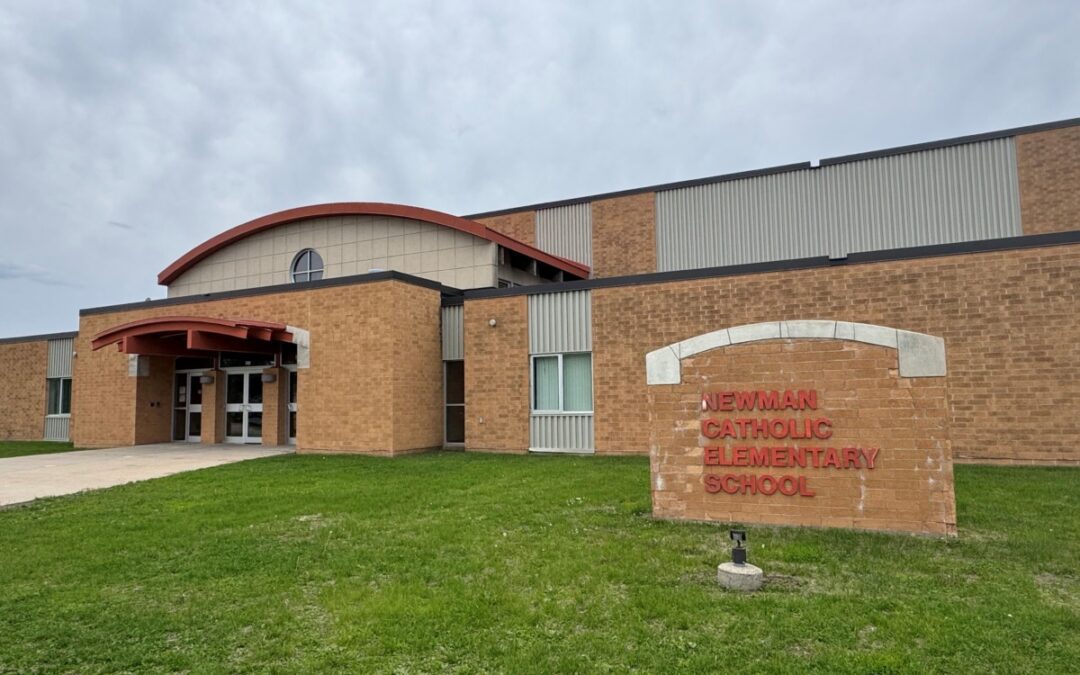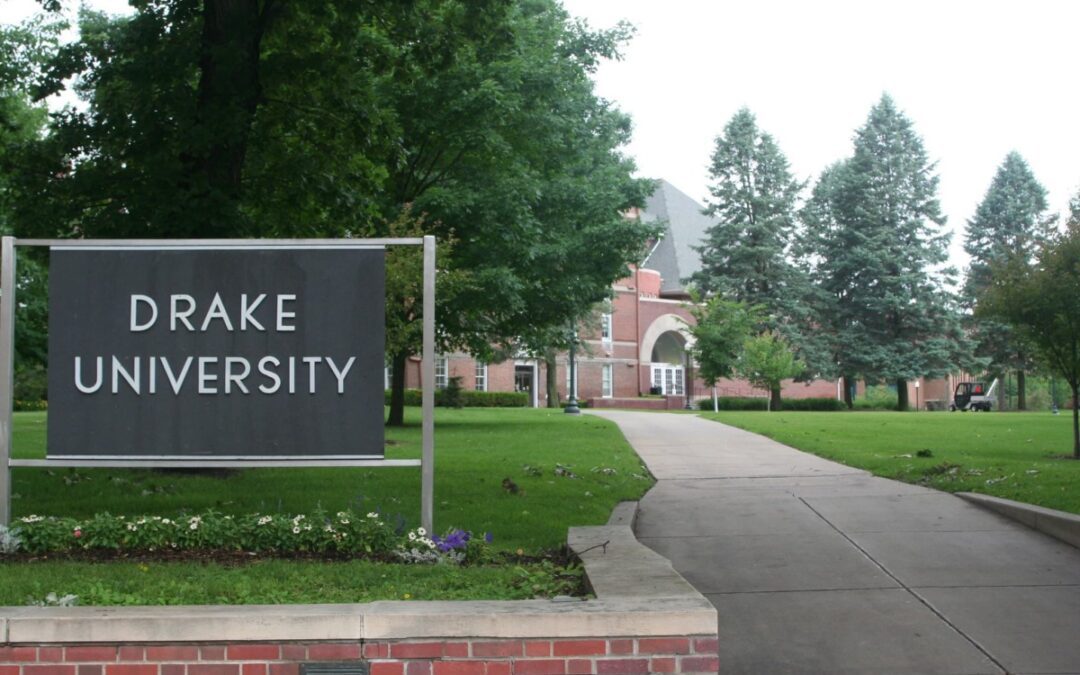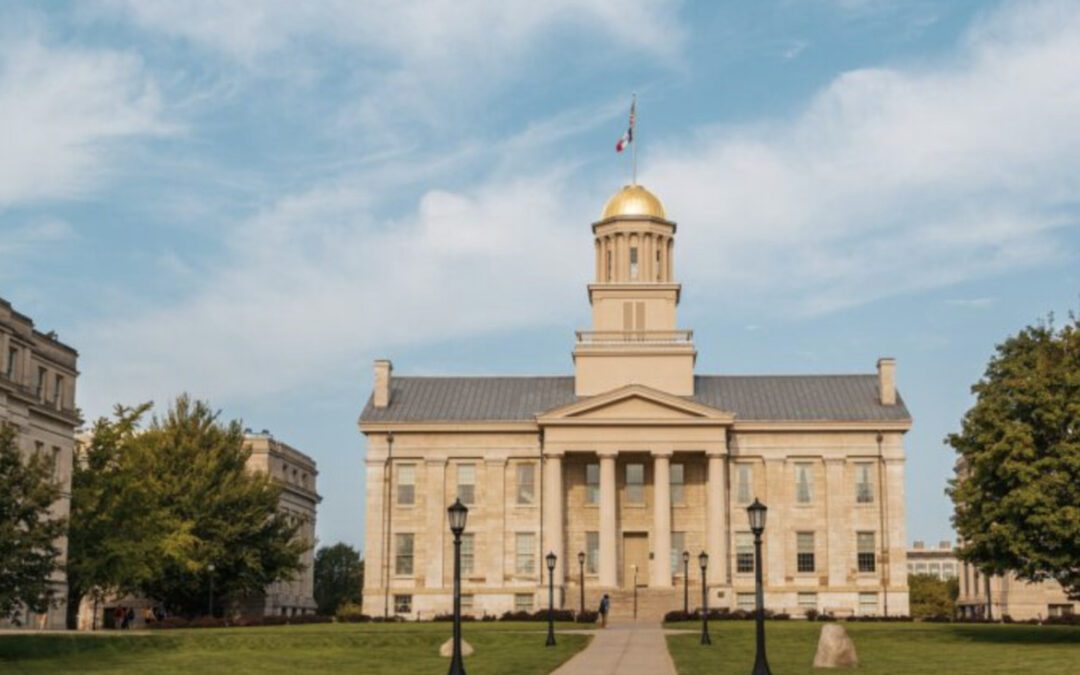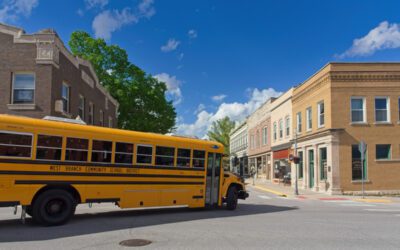
Photo credit: Lily Smith/The Register via Reuters Connect
30,000 reasons.
That’s what Interim Superintendent Matt Smith said he would point to: the district’s 30,000 students, when asked why Des Moines Public Schools’ upcoming bond referendum still matters in the wake of the recent scandal involving former superintendent Ian Roberts. Smith and other district leaders joined members of the Yes for Des Moines Schools! campaign for a meeting with the Des Moines Register editorial board on Friday, Oct. 3.
Smith said despite the “dynamic” situation the district has found itself in, the upcoming $265 million bond vote is still a priority. Voters will begin weighing in on whether to pass the bond when early voting starts Oct. 15. Election Day is Nov. 4.
“It’s not as predictable as it was seven days ago,” Smith said of his own schedule, moving from associate superintendent to the district’s top leader. “And so in spite of all the things that are happening around us, this is still the most important issue.”
Roberts’ arrest by U.S. Immigration and Customs Enforcement, followed by revelations about inconsistencies in his record, has drawn national ire at the district and its hiring practices, as well as the consulting firm that vetted him, which the district is now suing.
Smith said those developments, and the “distraction” he said they’ve created, cannot be allowed to derail the community’s work on the district’s five-year initiative, dubbed Reimagining Education.
He said he has tapped Career and Technical Education Director Tasha Brown to lead the Reimagining Education effort, which he had overseen, while he now manages the district.
“This plan supersedes me, it supersedes anybody, any one individual in our school district,” Smith said. “Because it is representative of our families and our students and what they are demanding of us to put forth for them, for their futures.”
What would the DMPS bond do?
The School Board unanimously approved placing the bond on the November ballot after Yes for Des Moines Schools! volunteers gathered 9,000 petition signatures. For a home valued at $200,000, the bond would add about $188 a year in property taxes for the next 20 years.
If passed, the $265 million would expand all-day preschool and create more opportunities for career and technical education, STEM, arts and fine arts.
Expansions are slated at East, North, Roosevelt and Lincoln high schools; Brody, Callanan, Goodrell, Hiatt, Hoyt, McCombs and Merrill middle schools; the Kurtz Opportunity Center; and Cowles, Jackson and Pleasant Hill elementary schools.
It would also pay for remodeling at Hoover and North high schools, Hoyt and Meredith middle schools, the Kurtz Opportunity Center and Brubaker Elementary. The district plans to demolish the Moulton School building and replace it with a new facility.
The five-year plan includes school closures, as well, though Smith said they will close even if the bond isn’t approved. Walnut Street Elementary is set to close in 2027, Howe Elementary in 2031 and Harding Middle School in 2032. The district’s central office will close too.
The measure is also a scaled-down version of an earlier $500 million, 10-year proposal. The School Board asked the committee tasked with making the plan to move faster and at a lower cost, so it picked the best parts of the proposal that could be done in five years for about half the price, Smith said.
Its focus on career and technical education would mirror some of the offerings already available at Central Campus, where students can take classes in hands on, real world work-based educational programs across several spectrums including marine biology, automotive repair, and medicine.
Brown said students want more access to those opportunities at their home schools. But she said the district cannot expand them without the bond.
“The technical skills that (students) have in creating products, side by side with our business partners and our industry partners, those are things that just cannot happen in a 600-foot classroom where there are 30 students and 30 guests,” she said. “That really limits the modality of learning that we are talking about.”
Brown also said that readiness is increasingly being measured when students begin searching for jobs or apply for advanced education.
“What is an authentic measure of readiness is, how many college courses has a student taken before they graduate? How many work-based learning or career-connected learning experiences have they taken before they graduate? And how many industry-recognized credentials are school districts offering their students across the state?,” she said. “And in order for a student to get career-ready, they have to have experiential learning taking place.”
The bond also comes as the district struggles with enrollment loss.
Nearly 2,900 students transferred to suburban districts in 2024-25, almost double the number five years ago. Smith said that while overall enrollment is declining, crowding in specific schools is worsening.
“Our schools, up to date, were not designed to hold the enrollment numbers that they actually have,” he said. The bond, he said, would alleviate capacity for students.
What do supporters of the DMPS bond say?
Supporters of the measure said at the editorial board meeting the investment is long overdue. Amber Graeber, a teacher and parent of students in the district, said it would help not only parents, students and teachers, but it would also benefit homeowners’ property values by improving the school district in which their homes sit.
“We haven’t asked or requested money from voters in this way since 1989,” Graeber said. “And if we let that sink in, this is a rare and very important moment here for the future of the city and the future of our city schools and our children.”
Jeff Lorenzen, CEO of American Equity Investment Life Insurance, who represents local business leaders on the committee, said the measure is about the city’s future as much as the schools’.
“I look at the Des Moines public schools as a key element of a healthy and vibrant community,” he said. “This is an investment in what I view is one of Des Moines’ greatest assets. They’re our future leaders. And I think at this point in time we cannot defer this decision to a later date. We have to start investing in that now.”
Parents on the committee said they agree.
“I think just as a parent, I feel really well informed,” said Natalie Merrill. “And so the reaction from the School Board and the district of keeping us informed throughout this only increases my desire to get this done, to have this bond pass, because we need it now more than ever.”
What happens if the DMPS bond fails?
If the measure fails, Smith and committee members warned the impact could be steep and immediate.
He said schools would still close even if the referendum fails. But without funding to add capacity, students would be crowded into smaller classrooms and class sizes would increase.
“If the bond doesn’t pass and we need to reduce overall costs, you’re going to see overall cost reduction strategies being applied not only to additional buildings, but it actually will be applied to staffing,” Smith said. ” … There will be a detriment for programming for kids, 100%.”
The measure needs 60% approval to pass.
Community sessions on DMPS’ Reimagining Education plan
- Saturday, Oct. 4: East Side Library, 2559 Hubbell Ave., 11 a.m. to 1 p.m.
- Tuesday, Oct. 7: Zion Lutheran Church, 4300 Beaver Ave., 11 a.m. to 1 p.m.
- Wednesday, Oct. 8: Hoover High School Library, 4800 S.W. Aurora Ave., 6 to 8 p.m.
- Thursday, Oct. 9: East Side Library, 2559 Hubbell Ave., 11 a.m. to 1 p.m.
- Thursday, Oct. 9: East High School Auditorium, 815 East 13th St., 6 to 8 p.m.
- Friday, Oct. 10: Des Moines Public Library, 1000 Grand Ave., 8 to 10 a.m.
- Saturday, Oct. 11: Monroe Community Center, 3015 Francis Ave., 9 to 11 a.m.
- Monday, Oct. 13: Kurtz Opportunity Center, 1000 Porter Ave., 8 to 10 a.m.
- Monday, Oct. 13: Plymouth Congregational Church, 4125 Ingersoll Ave., 1:30 to 3:30 PM
- Monday, Oct. 13: North High School Auditorium, 501 Holcomb Ave., 6 to 8 p.m.
- Tuesday, Oct. 14, virtual meeting (link will be posted closer to the date), 8 to 10 a.m.
- Tuesday, Oct. 14: virtual meeting (link will be posted closer to the date), 11 a.m. to 1 p.m.
- Tuesday, Oct. 14: Kurtz Opportunity Center, 1000 Porter Ave., 6 to 8 p.m.
- Friday, Oct. 17: virtual meeting (link will be posted closer to the date), 8:30 to 10:30 a.m.
- Saturday, Oct. 18: virtual meeting (link will be posted closer to the date), 9 to 11 a.m.
Nick El Hajj is a reporter at the Register. He can be reached at [email protected]. Follow him on X at @nick_el_hajj.
This article originally appeared on Des Moines Register: Des Moines schools still focused on $265 million bond vote, despite Ian Roberts arrest
Reporting by Nick El Hajj, Des Moines Register / Des Moines Register
USA TODAY Network via Reuters Connect
Related: What we know about Ian Roberts, the Des Moines Superintendent arrested by ICE

Urbandale now 6th Iowa school district to protect trans and nonbinary students
Urbandale has joined five other Iowa school districts in voting to protect its transgender and nonbinary students. Following the removal of gender...

Iowa Board of Regents tries banning university courses that teach about social justice
The Iowa Legislature passed a bill this session banning diversity, equity, and inclusion programs and trainings by "public entities," including...

Critics warn of ‘money laundering’ as Iowa expands school voucher program
Iowans have a right to know how their taxpayer dollars are being used—but when it comes to the state's private school voucher program, that’s not...

Find your passion at Drake University summer camps
Discover your passion at Drake University's 2025 summer camps! From voice training to business innovation, find the perfect program for high...

University of Iowa ranks high in US News grad school rankings
The University of Iowa boasts 52 programs recognized by US News for excellence, with rankings in the top five, highlighting its diverse academic...

The floodgates are open to help the wealthiest Iowans pay for private school
Iowa Republican lawmakers have passed a bill to boost K-12 education funding by 2%—not nearly enough to keep pace with what’s needed for a...




